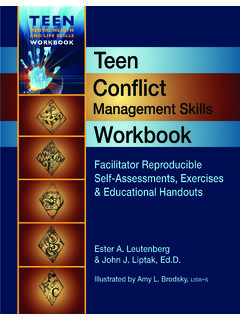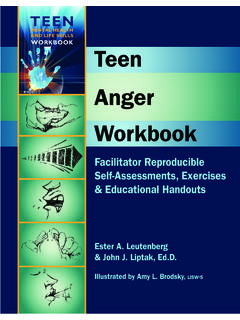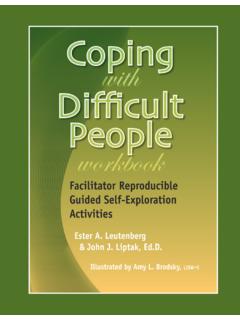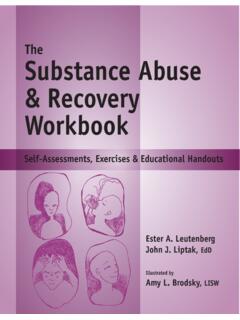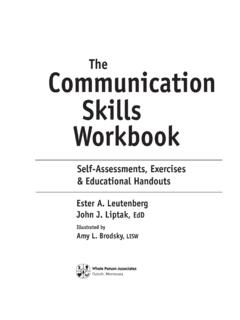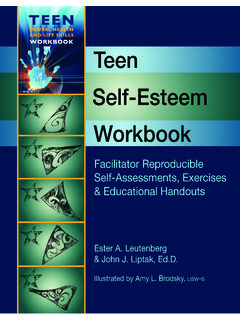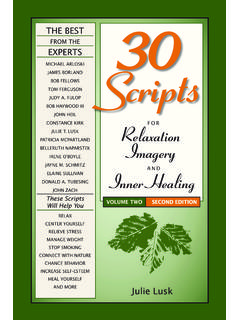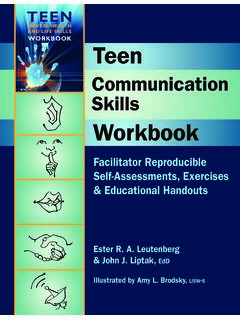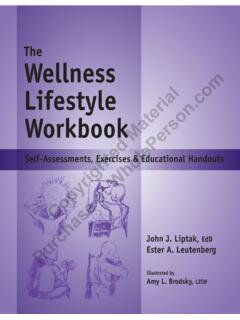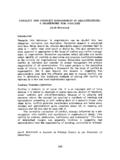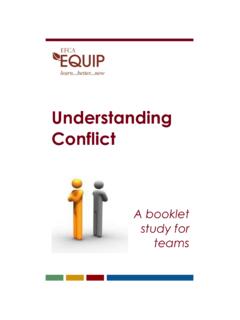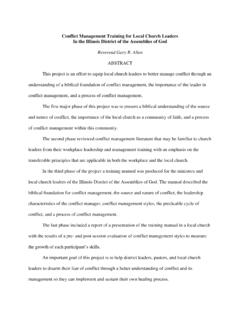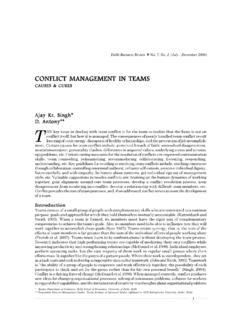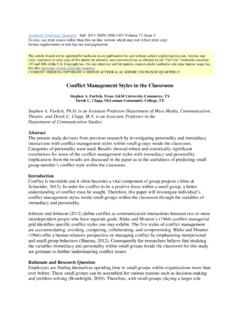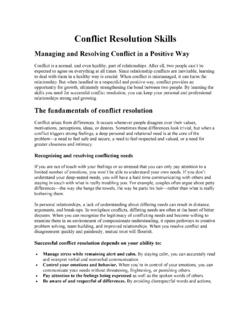Transcription of The Conflict Management Skills Workbook - …
1 C o n fl i c t TheWorkbookSelf-Assessments, Exercises & Educational HandoutsEster A. LeutenbergJohn J. Liptak, EdD Illustrated byAmy L. Brodsky, LISW-SWhole Person AssociatesDuluth, MinnesotaManagementSkillsWhole Person Associates 210 West Michigan Street Duluth, MN Conflict Management Skills Workbook Self-Assessments, Exercises & Educational HandoutsCopyright 2010 by Ester A. Leutenberg and John J. Liptak. All rights reserved. Except for short excerpts for review purposes and materials in the assessment, journaling activities, and educational handouts sections, no part of this book may be reproduced or transmitted in any form by any means, electronic or mechanical, including photocopying without permission in writing from the in the United States of America10 9 8 7 6 5 4 3 2 1 Editorial Director: Carlene Sippola Art Director: Joy Morgan DeyLibrary of Congress Control Number: 2010926457 ISBN: 978-1-57025-239-6 Using This Book (For the professional)In many ways, Conflict is a basic fact of life.
2 We have all experienced Conflict in our personal and professional lives. Because conflicts are disagreements resulting from people or groups having differences in attitudes, beliefs, values or needs, there will be times when Conflict is inevitable. People experience differences in any relationship. That Conflict exists is not a bad situation, as long as the Conflict is managed effectively. Resolving conflicts can be beneficial and lead to growth and maturity. Outcomes of constructive Conflict Management will increase confidence in several aspects of life Management : awareness that problems exist and need to be solved creative problem solving and decision making sense of well-being motivation and energy to take action implications / attitudes / responses of empathy and caring commitment to relationships impact of respect, trust and commitmentAny Conflict has the potential to be incredibly destructive to a relationship.
3 Managed in the wrong way, it can lead to extreme differences between people that can quickly spiral out of control. Each person will experience this Negotiations Model based on their point of view in a Conflict as they use the following format to help them resolve their issues / problems:NEGOTIATIONS MODELE xplorE BEliEfs ABout ConfliCtnEgotiAtE for whAt you nEEdknow your Conflict Management typEdEtErminE hot ButtonsusE ACtivE listEning Skills (Continued)Using This Book (For the professional, continued)The Conflict Management Skills Workbook contains five separate sections to help participants learn more about themselves and the Skills they possess to manage conflicts that occur in their lives. Participants will learn new Skills and their importance in preventing and resolving conflicts .
4 The sections are:1) BELIEFS ABOUT Conflict SCALE helps individuals to explore their beliefs about the process and outcomes of ) Conflict Management STYLES SCALE helps individuals identify their preferred style for managing Conflict . 3) LISTENING FOR MEANING SCALE helps individuals to examine the active listening Skills they possess for preventing conflicts and then dealing with Conflict situations. 4) HOT BUTTONS SCALE helps individuals identify the situations that trigger Conflict in their lives. 6) NEGOTIATION STYLE SCALE helps individuals identify their negotiation style for what they want and section serves as an avenue for individual self-reflection, as well as for group experiences revolving around identified topics of importance. Each assessment includes directions for easy administration, scoring and interpretation.
5 Also included are exploratory activities, reflective journaling activities and educational handouts to help participants discover their habitual effective and ineffective Conflict Management Skills . Finally, instruction is provided for enhancing participants most critical weaknesses when attempting to prevent or resolve real-life art of self-reflection goes back many centuries and is rooted in many of the world s greatest spiritual and philosophical traditions. Socrates, the ancient Greek philosopher, was known to walk the streets engaging the people he met in philosophical reflection and dialogue. He felt that this type of activity was so important in life that he went so far as to proclaim, The unexamined life is not worth living! The unexamined life is one in which the same routine is continually repeated without ever thinking about its meaning to one s life and how one s life really could be lived.
6 However, a structured reflection and examination of beliefs, assumptions, characteristics and patterns can provide a better understanding , which can lead to a more satisfying life. A greater level of self- understanding about important life Skills is often necessary to make positive, self-directed changes in the negative patterns that keep repeating. The assessments and exercises in this book can help promote this self- understanding . Through involvement in the in-depth activities, participants claim ownership in the development of positive patterns.(Continued)Journaling is an extremely powerful tool for enhancing self-discovery, learning, transcending traditional problems, breaking ineffective life habits, and helping to heal from psychological traumas of the past. From a physical point of view, writing reduces stress and lowers muscle tension, blood pressure and heart rate levels.
7 Psychologically, writing reduces sadness, depression and general anxiety, and leads to a greater level of life satisfaction and optimism. Behaviorally, writing leads to enhanced social Skills , emotional intelligence and creativity. It also leads to improved relationships through being able to effectively manage conflicts that occur in professional and personal combining reflective assessment and journaling, participants will be exposed to a powerful method of combining verbalizing and writing to reflect on and solve problems. Participants will become more aware of the strength and weaknesses of their specific Conflict Management and negotiation for using the assessments and activities in this book is important. The authors suggest that prior to administering any of the assessments in this book, you complete them yourself.
8 This will familiarize you with the format of the assessments, the scoring directions, the interpretation guides and the journaling activities. Although the assessments are designed to be self-administered, scored and interpreted, this familiarity will help prepare facilitators to answer questions about the assessments for participants. Using This Book (For the professional, continued)The Assessments, Journaling Activities, and Educational HandoutsThe Assessments, Journaling Activities, and Educational Handouts in The Conflict Management Skills Workbook are reproducible and ready to be photocopied for participants use. Assessments contained in this book focus on self-reported data and are similar to ones used by psychologists, counselors, and therapists. The accuracy and usefulness of the information provided is dependent on the truthful information that each participant provides through self-examination.
9 By being honest, participants help themselves to learn about their hot buttons that cause conflicts with other people, their style of handling conflicts , and the Skills needed to effectively handle, or even prevent, assessment instrument can provide participants with valuable information about themselves; however, it cannot measure or identify everything about them. The purposes of the assessments are not to pigeon-hole certain characteristics, but rather to allow participants to explore all of their characteristics. This book contains self-assessments, not tests. Tests measure knowledge or whether something is right or wrong. For the assessments in this book, there are no right or wrong answers. These assessments ask for personal opinions or attitudes about a topic of importance in the participant s administering the assessments in this Workbook , remember that although the items are generically written so that they will be applicable to a wide variety of people, they will not account for every possible variable for every person.
10 Use the assessments to help participants identify possible negative themes in their lives and find ways to break the hold of these patterns and their effects. Advise the participants taking the assessments that they should not spend too much time trying to analyze the content of the questions; their initial response will most likely be true. Regardless of individual scores, encourage participants to talk about their findings and their feelings pertaining to what they have discovered about themselves. Talking about health, wellness, and overall well-being as it relates to Conflict can enhance the life of participants. These wellness exercises can be used by group facilitators working with any populations who want to strengthen their overall wellness. A particular score on any assessment does not guarantee a participant s level of Conflict Management skill.
